
Gerard David Painting Reproductions 1 of 1
c.1455-1523
Dutch Northern Renaissance Painter
Gerard David (c. 1455, Oudewater - August 13th 1523, Bruges) was an early Dutch Renaissance artist known for his brilliant use of colour. He was born in Oudewater, now located in Utrecht. Most of his career took place in Bruges, where he was a member of the painters' guild. Upon the death of Hans Memling in 1494, David became Bruges' leading painter.
In the early 1860s David was rescued from oblivion by W. J. H. Weale, whose researches in the archives of Bruges brought to light the main facts of the painter's life. There is now documentary evidence for the following: that David came to Bruges in 1483, presumably from Haarlem, where he had formed his early style under Albert van Ouwater; he joined the guild of St Luke at Bruges in 1484 and became dean of the guild in 1501; in 1496 he married Cornelia Cnoop, daughter of the dean of the goldsmiths' guild; he became one of the town's leading citizens; he died on August 13, 1523 and was buried in the Church of Our Lady at Bruges.
In his early work, David had followed Haarlem artists such as Dirck Bouts, Ouwater and Geertgen tot Sint Jans, though he had already given evidence of superior power as a colourist. To this early period belong the St John of the Kaufmann collection in Berlin and the Saltings St Jerome. In Bruges he studied and copied masterpieces by the Van Eyck, Rogier van der Weyden, and Hugo van der Goes. Here he came directly under the influence of Memling, the master whom he followed most closely. It was from him that David acquired a solemnity of treatment, greater realism in the rendering of human form, and an orderly arrangement of figures.
Another master was to influence him later in life, when in 1515 he visited Antwerp and was impressed with the work of Quentin Matsys, who had introduced a greater vitality and intimacy in the conception of sacred themes. David's Pietà in the National Gallery, London, and the Descent from the Cross in the Cavallo collection Paris (Guildhall, 1906), were painted under this influence and are remarkable for their sense of dramatic movement. But the works on which David's fame has rested most securely are the great altarpieces he painted before his visit to Antwerp: the Marriage of St Catherine, at the National Gallery; the triptych of the Madonna Enthroned and Saints of the Brignole-Sale collection in Genoa; the Annunciation of the Sigmaringen collection; and above all, the Madonna with Angels and Saints, which he painted without asking a fee from the Carmelite Nuns of Sion at Bruges, and which is now in the Rouen museum.
Only a few of his works have remained in Bruges: The Judgment of Cambyses, The Flaying of Sisamnes and the Baptism of Christ in the town museum, and the Transfiguration in the Church of Our Lady. The rest were scattered around the world, and to this may be due the oblivion into which his very name had fallen; this, and the fact that, for all the beauty and the soulfulness of his work, he had nothing innovative to add to the history of art. Even in his best work he had only given newer variations of the art of his predecessors and contemporaries. His rank among the masters was renewed, however, when a considerable number of his paintings were assembled at Bruges for a 1902 exhibition of the early Flemish painters.
At the time of David's death, the glory of Bruges and its painters was on the wane: Antwerp had become the leader in art as well as in political and commercial importance. Of David's pupils in Bruges, only Isenbrandt, A. Cornelis and Ambrosius Benson achieved importance. Among other Flemish painters, Joachim Patinir and Jan Mabuse were to some degree influenced by him.
Eberhard Freiherr von Bodenhausen published in 1905 a very comprehensive monograph on Gerard David and his School (Munich, F. Bruckmann), together with a catalogue raisonné of his works, which, after careful analysis, are reduced to a total of forty-three.
In the early 1860s David was rescued from oblivion by W. J. H. Weale, whose researches in the archives of Bruges brought to light the main facts of the painter's life. There is now documentary evidence for the following: that David came to Bruges in 1483, presumably from Haarlem, where he had formed his early style under Albert van Ouwater; he joined the guild of St Luke at Bruges in 1484 and became dean of the guild in 1501; in 1496 he married Cornelia Cnoop, daughter of the dean of the goldsmiths' guild; he became one of the town's leading citizens; he died on August 13, 1523 and was buried in the Church of Our Lady at Bruges.
In his early work, David had followed Haarlem artists such as Dirck Bouts, Ouwater and Geertgen tot Sint Jans, though he had already given evidence of superior power as a colourist. To this early period belong the St John of the Kaufmann collection in Berlin and the Saltings St Jerome. In Bruges he studied and copied masterpieces by the Van Eyck, Rogier van der Weyden, and Hugo van der Goes. Here he came directly under the influence of Memling, the master whom he followed most closely. It was from him that David acquired a solemnity of treatment, greater realism in the rendering of human form, and an orderly arrangement of figures.
Another master was to influence him later in life, when in 1515 he visited Antwerp and was impressed with the work of Quentin Matsys, who had introduced a greater vitality and intimacy in the conception of sacred themes. David's Pietà in the National Gallery, London, and the Descent from the Cross in the Cavallo collection Paris (Guildhall, 1906), were painted under this influence and are remarkable for their sense of dramatic movement. But the works on which David's fame has rested most securely are the great altarpieces he painted before his visit to Antwerp: the Marriage of St Catherine, at the National Gallery; the triptych of the Madonna Enthroned and Saints of the Brignole-Sale collection in Genoa; the Annunciation of the Sigmaringen collection; and above all, the Madonna with Angels and Saints, which he painted without asking a fee from the Carmelite Nuns of Sion at Bruges, and which is now in the Rouen museum.
Only a few of his works have remained in Bruges: The Judgment of Cambyses, The Flaying of Sisamnes and the Baptism of Christ in the town museum, and the Transfiguration in the Church of Our Lady. The rest were scattered around the world, and to this may be due the oblivion into which his very name had fallen; this, and the fact that, for all the beauty and the soulfulness of his work, he had nothing innovative to add to the history of art. Even in his best work he had only given newer variations of the art of his predecessors and contemporaries. His rank among the masters was renewed, however, when a considerable number of his paintings were assembled at Bruges for a 1902 exhibition of the early Flemish painters.
At the time of David's death, the glory of Bruges and its painters was on the wane: Antwerp had become the leader in art as well as in political and commercial importance. Of David's pupils in Bruges, only Isenbrandt, A. Cornelis and Ambrosius Benson achieved importance. Among other Flemish painters, Joachim Patinir and Jan Mabuse were to some degree influenced by him.
Eberhard Freiherr von Bodenhausen published in 1905 a very comprehensive monograph on Gerard David and his School (Munich, F. Bruckmann), together with a catalogue raisonné of his works, which, after careful analysis, are reduced to a total of forty-three.
10 Gerard David Paintings
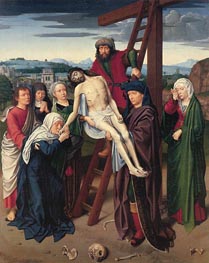
The Deposition c.1510/15
Oil Painting
$15874
$15874
Canvas Print
$74.09
$74.09
SKU: DAG-3191
Gerard David
Original Size: 142.6 x 112.4 cm
Frick Collection, New York, USA
Gerard David
Original Size: 142.6 x 112.4 cm
Frick Collection, New York, USA
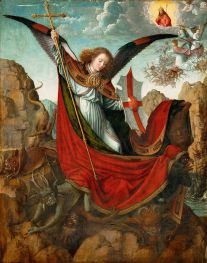
Altar of the Archangel Michael c.1510
Oil Painting
$7003
$7003
Canvas Print
$74.43
$74.43
SKU: DAG-4315
Gerard David
Original Size: 66 x 53 cm
Kunsthistorisches Museum, Vienna, Austria
Gerard David
Original Size: 66 x 53 cm
Kunsthistorisches Museum, Vienna, Austria
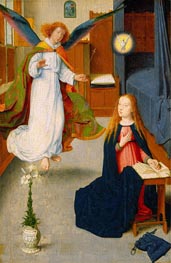
The Annunciation c.1490
Oil Painting
$1997
$1997
Canvas Print
$61.81
$61.81
SKU: DAG-4316
Gerard David
Original Size: 34.8 x 23.3 cm
Detroit Institute of Arts, Michigan, USA
Gerard David
Original Size: 34.8 x 23.3 cm
Detroit Institute of Arts, Michigan, USA
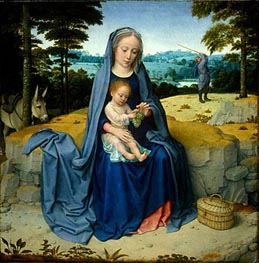
The Rest on the Flight into Egypt c.1510
Oil Painting
$2345
$2345
Canvas Print
$61.81
$61.81
SKU: DAG-4317
Gerard David
Original Size: 42 x 42.2 cm
National Gallery of Art, Washington, USA
Gerard David
Original Size: 42 x 42.2 cm
National Gallery of Art, Washington, USA
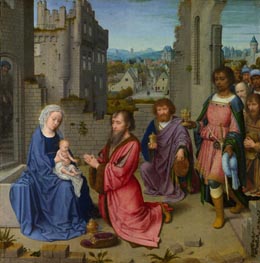
Adoration of the Kings c.1515
Oil Painting
$7315
$7315
Canvas Print
$92.49
$92.49
SKU: DAG-4318
Gerard David
Original Size: 60 x 59.2 cm
National Gallery, London, UK
Gerard David
Original Size: 60 x 59.2 cm
National Gallery, London, UK
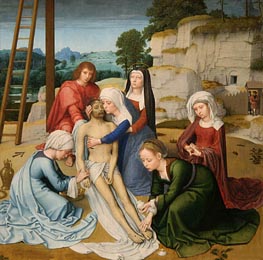
Lamentation (Deposition) c.1515/23
Oil Painting
$6911
$6911
Canvas Print
$92.66
$92.66
SKU: DAG-4319
Gerard David
Original Size: 63 x 62 cm
National Gallery, London, UK
Gerard David
Original Size: 63 x 62 cm
National Gallery, London, UK
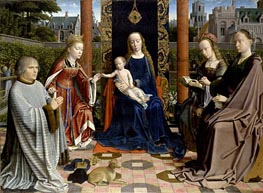
The Virgin and Child with Saints and Donor c.1510
Oil Painting
$13340
$13340
Canvas Print
$67.96
$67.96
SKU: DAG-4320
Gerard David
Original Size: 105.8 x 144.4 cm
National Gallery, London, UK
Gerard David
Original Size: 105.8 x 144.4 cm
National Gallery, London, UK
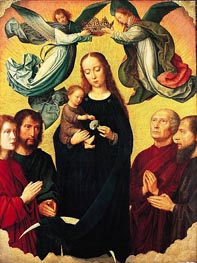
The Coronation of the Virgin c.1515
Oil Painting
$2629
$2629
SKU: DAG-4321
Gerard David
Original Size: unknown
Norton Simon Museum of Art, Pasadena, USA
Gerard David
Original Size: unknown
Norton Simon Museum of Art, Pasadena, USA
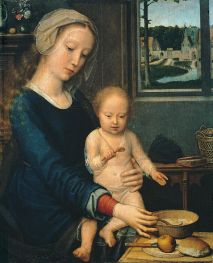
Virgin and Child with the Milk Soup c.1510/15
Oil Painting
$2099
$2099
Canvas Print
$61.81
$61.81
SKU: DAG-4322
Gerard David
Original Size: 41 x 32 cm
Public Collection
Gerard David
Original Size: 41 x 32 cm
Public Collection
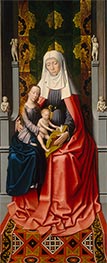
Saint Anne with the Virgin and Child c.1500/20
Oil Painting
$6075
$6075
Canvas Print
$61.81
$61.81
SKU: DAG-17816
Gerard David
Original Size: 232.5 x 96 cm
National Gallery of Art, Washington, USA
Gerard David
Original Size: 232.5 x 96 cm
National Gallery of Art, Washington, USA